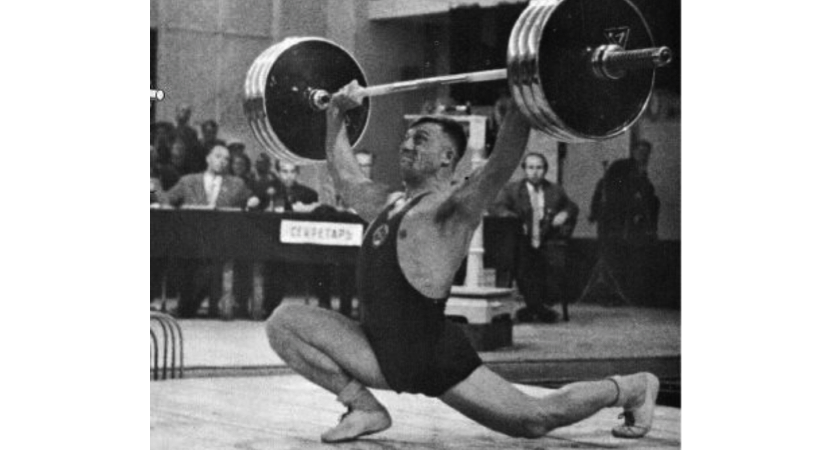
3 Things I have learned from Rudolf Pflugfelder
Rudolf Pflugfelder is a former Russian weightlifter who has won an Olympic Gold Medal in the 1964 Tokyo Olympics and a former Russian weightlifting coach who produced many Olympic Champions, World Champions and trained athletes that broke over 200 world records.
When he started out weightlifting he was working in a mine 12 hours a days, 6 days a week and then trained 3 times per week weightlifting himself without a coach. His highly critical approach to his own training and consistent experimenting with new variations of exercises and setups led him to win the World Championships and an Olympic Gold Medal. Pflugfelder started weightlifting at 22 years old and with just 3 training sessions a week, while working 72h a week he made very quick progress. While lifting himself he started coaching a group of lifters in his hometown that also started to move serious weights. This and him winning the Worlds while still working full-time in the mine gained the attention of the Russian Weightlifting Federation which eventually decided to give him a training hall with bars, plates and platforms and over 200 lifters to coach.
A few years later his hometown of Schachty had 7 Olympic Champions with 6 of them being weightlifters, one himself and 5 that he trained. Amongst the lifters he worked with were Vasily Alexeev, the first name to Clean & Jerk 500lbs and David Rigert, the current Russian Weightlifting, National Team Coach.
A couple days ago I wrote an Instagram Post that quoted Rudolf Pflugfelder which reminded me of looking through my notes that I took on February 13th in 2010 when I visited him at his home in Zierenberg, Germany where he resides with his wife. It was a great day, his wife and him were great hosts, we had two meals together, where he insisted both times that I need to eat more to get stronger and he was willing to answer all my questions. And I had many.
We went deep into exercise selection, program design and periodization as well as some very cool, yet simple assessments he used to select lifters for his team. Three of many gems I took away are:
1. Experiment, observe, analyze, repeat.
One of the questions I asked him was why he believes that he had such great success as a lifter and coach. His answer was: „They gave me a training hall with over 200 lifters, and all I did was be there all day and experiment, observe, analyze, repeat. Consistently trying to figure out what works better and what works best. He also considered this the backbone of great coaching. And we would not just observe his own lifters, he even would also get insights into the training log of other camps and countries to get greater insight on frequency, exercise selection, sets/reps and tonnage. A constant approach in consistently refining his methods and systems. That eventually led him break 13 world records himself and over 200 world records with the lifters he worked with. Success leaves clues.
2.„Today there is too much anarchy in training, thats why results are missing“
Interestingly almost the identical statement was made by Weightlifting Coach Ivan Abadjiev during a seminar that I attended with him in 2010. The lack of a clearly structured system on different levels creates a lack of progress. Especially in a sport like weightlifting or any form of training such as strengthtraining that is a rather dull practice. Clearly structured systems are crucial to success as I also explain in more detail in this article „Programs vs. Systems“. On top of a systems approach to training the clear distinction between athlete and coach is crucial for longterm success of an individual athlete as well as a whole team, organization or nation. Many countries prove so consistently. Yet, its a missing aspect in many organizations and definitely gyms all over the world. There has to be multi-level structure to achieve success in width and height.
3. Post-tetanic potentiation has been discovered in the 1960s
He calls it „Blitztraining“: Post-tetanic potentiation has been shown in sports science for the first time in the late 1980s and then has proven over the decades after. Post-tetanic potentiation is basically an effect observed after lifting a certain submaximal load with minimal fatigue in total workload that has a stimulating effect on the nervous system at different levels for minutes, for 4 to 6 hours and up to two days. He observed this in the early 60s when on official from his hometown came to the morning training and asked if the lifters could do a performance during an official event in the same night. Training was immediately stopped half way through the session and all lifters had to rest until that night. And then that night almost all of them were hitting new PRs. That made him think. And from then on for every competition lifters would perform half of a training session in the morning before the event. To use the post-tetanic potentiation, fire the nervous system and increase power output to set new PRs and obviously win.
It was a great day that I spent with him. Unfortunately we haven’t met since. Recently I read an article about him that said that he can still trains 3 days per week and can still press 90kg at age 89, which made me smile as this sums up Rudolf Pflugfelder relentless, mathematical and methodical approach that made him one of the most successful coaches in weightlifting history. Unfortunately due to political reasons he never received the press and platform to spread his work to a broader audience.
On top of the three gems above he made many great points that resonated with myself. From a the emphasized of strengthening the lower back, building base qualities first, to squats and deadlifts as the ultimate strength builders and his take on how is 10 year old grandson is getting trained in football.
He even coined the term „Schlagtraining“ for overloading the system with very high volume – in his case he would double the sessions and sets for each lifter – for one week and then recovering a few days to supercompensate, an approach he started to use in the 50s that has surfaced in the last years again, as in the Squat Holiday and the Strength and Mass Holiday.
To finish this article and my day at his home, a great quote of his: „Don’t read too much, instead talk to people“.
Picture: Rudolf Pflugfelder himself at the bottom of a Split Snatch, a variation of the Snatch that has disappeared in modern times. (Picture: ftaro.ru)
